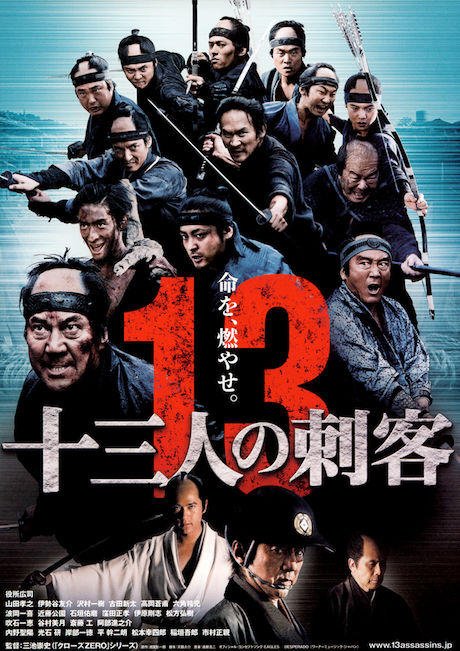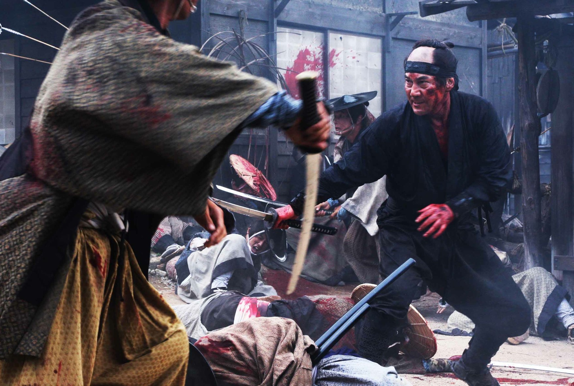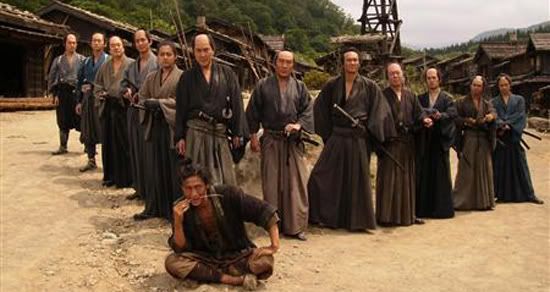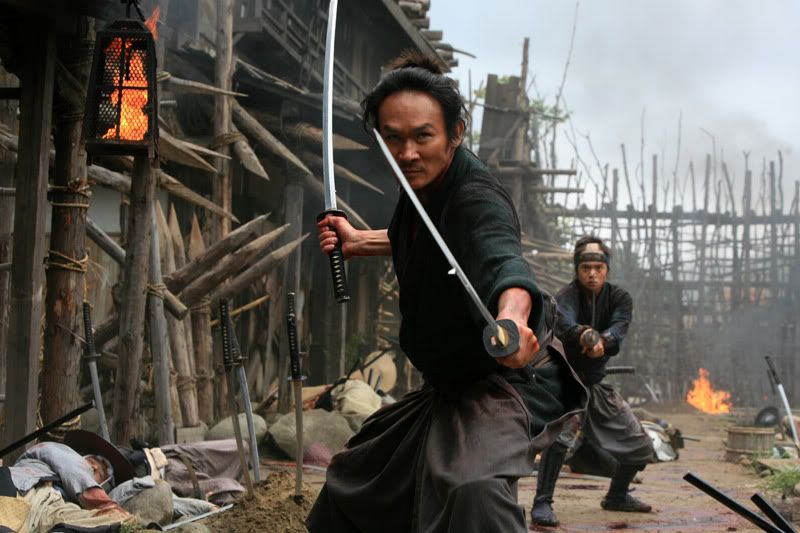13 Assassins

Title: 13 Assassins (Extended Version)
Genre: Action, Drama
Rating: 3.5/5
Starring: Kôji Yakusho, Takayuki Yamada Yûsuke Iseya
Director: Takeshi Miike
Language: Japanese
 When this was showing at my local indie cinema, I just knew that it was only a matter of time before I went to go see it. Reviving the stagnating 'chanbara' genre (that samurai flicks to most people) of the 60s, he starts to work bringing the old '63 classic back to life. Without taking the same modern twists expected from the likes of 'Azumi' and 'Chanbara Beauty,' this is more than a simple action film but a period drama with as much in common with Kurosawa's classics as it does contemporary offerings, going to great lengths to make sure the audience is aware of the context the film finds itself in. With the Edo period of Japan coming to a close, the country has long since been in a state of peace but the next in line for the Shogunate of the powerful Akashi clan, Naritsugu, threatens to change all that; malicious and bloodthirsty, he longs for a re-emergence of the war times that lay behind them, using his subjects as little more than toys for his amusement. It soon falls upon Sir Doi, senior advisor to the Shogun, to assemble an army of assassins to prevent his reign from ever emerging.
When this was showing at my local indie cinema, I just knew that it was only a matter of time before I went to go see it. Reviving the stagnating 'chanbara' genre (that samurai flicks to most people) of the 60s, he starts to work bringing the old '63 classic back to life. Without taking the same modern twists expected from the likes of 'Azumi' and 'Chanbara Beauty,' this is more than a simple action film but a period drama with as much in common with Kurosawa's classics as it does contemporary offerings, going to great lengths to make sure the audience is aware of the context the film finds itself in. With the Edo period of Japan coming to a close, the country has long since been in a state of peace but the next in line for the Shogunate of the powerful Akashi clan, Naritsugu, threatens to change all that; malicious and bloodthirsty, he longs for a re-emergence of the war times that lay behind them, using his subjects as little more than toys for his amusement. It soon falls upon Sir Doi, senior advisor to the Shogun, to assemble an army of assassins to prevent his reign from ever emerging.This set up to the final battle, in finding samurai willing to take up open arms against their master as well as the planning of the attack itself takes up a good first half of the film and, despite some impatient shuffling from the audience around me, was done in a manner than genuinely invokes the spirit of the classic films before it; the depravity of Naritsugu made apparent from the outset setting forth this rollercoaster momentum for the film, only accelerated by the powerful opening of the samurai Mamiya making his opinion known by performing Harakiri (killing yourself by slicing open your own stomach). It sets the scene, reminding history buffs of the events at the time without losing those not up to scratch on their Japanese history whilst doing more than just villify the enemy but also set the stage for our heroes to stand up for their samurai code and do right by their country, yet sadly character development is not one of this films strong suits.
Whilst difficult to convey such a large cast in a short period of time, the target, Naritsugu, never seems to be able to decide on which way to play the character; at times he hints at being more than just a mindless wake of devastation and suffering, offering some sort of explanation
 for his actions that never seem to fully pan out in the context of the story; he's not the rampant madman with a thirst for blood, showing restraint in many situations, nor is he the cold calculating killer to be wary of, content in causing pain on whim. He's more than anything just a man without a conscience or emotion, and once his bloody introduction is dealt with, does little to maintain the sense of villainy about his character. There's the comic relief, influenced by more modern works, that arrives in the form of the beast hunter whose very presence lends a distinct juxtaposition to the way the samurai view life, and then the role of Shinzaemon; the brave warrior who is once described as 'not being the strongest or best fighter, but an opponent who will never back down from his beliefs,' making him the ideal candidate to lead the assault. Of the other 11 assassins, chief guard to Naritsugu, and Sir Doi, senior advisor to the Shogun who orders the attack, we are given some sort of brief background to less than half and still nothing really feels fleshed out.
for his actions that never seem to fully pan out in the context of the story; he's not the rampant madman with a thirst for blood, showing restraint in many situations, nor is he the cold calculating killer to be wary of, content in causing pain on whim. He's more than anything just a man without a conscience or emotion, and once his bloody introduction is dealt with, does little to maintain the sense of villainy about his character. There's the comic relief, influenced by more modern works, that arrives in the form of the beast hunter whose very presence lends a distinct juxtaposition to the way the samurai view life, and then the role of Shinzaemon; the brave warrior who is once described as 'not being the strongest or best fighter, but an opponent who will never back down from his beliefs,' making him the ideal candidate to lead the assault. Of the other 11 assassins, chief guard to Naritsugu, and Sir Doi, senior advisor to the Shogun who orders the attack, we are given some sort of brief background to less than half and still nothing really feels fleshed out.Whilst you'd think given his past work the action would form the highlight, it actually often feels less poignant than the build up. Whilst the tricks our assassins use in demolishing a village in an attempt to level the playing field plays off like the best action films have to offer, utilising superb set-pieces and merging real-time action with CGI in an indistinguishable manner many Hollywood contemporaries should look to for pointers, it soon degrades into mindless sword-slashing, with only the beast hunter lending any variety to the proceedings. That's not necessarily to say that the swordplay was badly choreographed, but due to the problematic build-up of our cast we find ourselves somewhat detached from those we're meant to care about as they kill those we aren't, until they meet an emotionally underwhelming demise at the forces overpowering them. It's all done to excess, and whilst pleasing to those thirsting for some blood in the mud, has too long a build up for action hounds and lacks a certain sense of finesse to the end result that kept me fascinated by the classic 'Lady Snowblood' or the infamous 'Lone Wolf and Cub' saga.
Instead this films real strength is in the not-so-subtle subtext; the very notion of what it means to be a samurai. How much is influenced by his personal belief is in question, but there is one pivotal – at least to my mind – scene where Naritsugu explains that samurai are losing
 their way, and by acting maliciously he's really keeping them in line and on their toes, using fear to promote their unwavering devotion to their master. It all makes an odd sort of sense as the plot thickens and we bear witness to the immense difficulty in finding those who have not succumbed to the decaying values the samurai once bore; who show the spirit to do right by their country and not sit idly by, demonstrating this unwavering loyalty to their master that would permit them to not only take another's life in line with their belief, but die themselves in trying to uphold it. Where the Shogunate is falling to corruption and a life can be taken in the blink of an eye, the emphasis on their reason for fighting is one that can never be made too apparent. Whilst no means without its flaws, Miike remains remarkably consistent in his reworking of a masterpiece that neither surpasses nor offends the classics.
their way, and by acting maliciously he's really keeping them in line and on their toes, using fear to promote their unwavering devotion to their master. It all makes an odd sort of sense as the plot thickens and we bear witness to the immense difficulty in finding those who have not succumbed to the decaying values the samurai once bore; who show the spirit to do right by their country and not sit idly by, demonstrating this unwavering loyalty to their master that would permit them to not only take another's life in line with their belief, but die themselves in trying to uphold it. Where the Shogunate is falling to corruption and a life can be taken in the blink of an eye, the emphasis on their reason for fighting is one that can never be made too apparent. Whilst no means without its flaws, Miike remains remarkably consistent in his reworking of a masterpiece that neither surpasses nor offends the classics.
Comments
Post a Comment